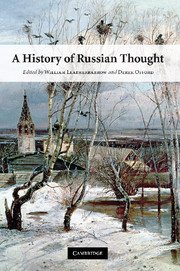Book contents
- Frontmatter
- Contents
- Preface
- List of contributors
- Dates, transliteration and other conventions
- Dates of reigns
- Russian titles of journals, newspapers and miscellanies
- PART I CONTEXT
- PART II INTELLECTUAL CURRENTS
- PART III THEMES AND CONSTRUCTS
- 9 The West
- 10 The East
- 11 The people
- 12 The intelligentsia and capitalism
- 13 Natural science
- PART IV THE AFTERLIFE OF CLASSICAL THOUGHT
- Biographical details of thinkers and writers
- Selected bibliography
- Index
11 - The people
Published online by Cambridge University Press: 05 June 2012
- Frontmatter
- Contents
- Preface
- List of contributors
- Dates, transliteration and other conventions
- Dates of reigns
- Russian titles of journals, newspapers and miscellanies
- PART I CONTEXT
- PART II INTELLECTUAL CURRENTS
- PART III THEMES AND CONSTRUCTS
- 9 The West
- 10 The East
- 11 The people
- 12 The intelligentsia and capitalism
- 13 Natural science
- PART IV THE AFTERLIFE OF CLASSICAL THOUGHT
- Biographical details of thinkers and writers
- Selected bibliography
- Index
Summary
Donald Fanger, in an essay on the representation of the peasantry in classical Russian literature, contends that the peasant
can only be approached from outside, by writers who, because they have chosen him as a subject, must find some significance in his existence. That significance is the writer's own invention or discovery; it answers his needs and is a part of his moral life. Thus the story of the peasant in Russian literature is the story of the changing moods and attitudes of the most influential segment of educated society, and it tells us much more about that society than about the peasant himself.
In this chapter I shall apply a similar thesis more broadly to the corpus of classical Russian thought, which may be said to include imaginative literature. That is to say, I shall argue that the Russian common people, or narod, as conceived by the nineteenth-century intelligentsia, constituted not so much a clearly definable social entity as a construct fashioned in the minds of the intelligentsia. The function of this construct was to assist the intelligentsia in the urgent tasks of defining the identity and mission of Russia as a nation and of clarifying its own role within the nation. The emergence of the construct was one manifestation of the intelligentsia's attempt to solve the riddle of Russia's relationship with the West.
- Type
- Chapter
- Information
- A History of Russian Thought , pp. 241 - 262Publisher: Cambridge University PressPrint publication year: 2010

